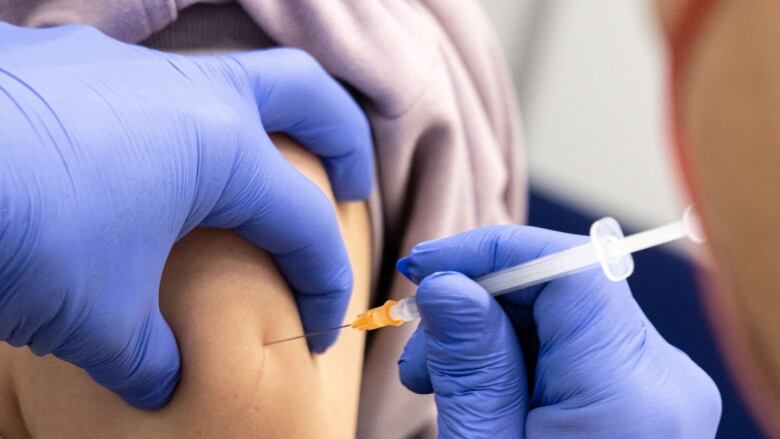More Manitobans getting 1st dose of COVID-19 vaccine
Possible approval of Novavax could spur more to get first doses, Dr. Joss Reimer says

Tens of thousands of Manitobans are still rolling up their sleeves to receive their first doses of the COVID-19 vaccine.
This far into the pandemic and the provincial vaccination campaign, the number of people still getting first doses can, in part, be attributed to people overcoming vaccine hesitancy, said Dr. Joss Reimer, the medical lead of the vaccine implementation task force in a news conference on Wednesday.
"They wanted to see how things went. They were nervous with this being a new vaccine and wanted to see the effects that the vaccine had on the community, on their friends, their families," Reimer said.
Now that they've seen first-hand that the vaccines are safe and effective, "many people feel more comfortable moving forward" with vaccination, she added.
Between Nov. 2021 and Feb. 2022, a total of 99,012 people received their first dose, according to the provincial vaccine dashboard. Comparatively, during the three months prior (Aug. 2021 to Nov. 2021), that number was 76,456.
"There's some folks as well who might be new to Manitoba, or because of new employment there's new requirements on them. And so you do have individuals who, because of new situations in their own lives, may be choosing to get the vaccine," Reimer said.
Travel-related vaccine mandates were announced by the federal government in November of 2021. The travel mandate requires people to have at least two dosesto enter the country.
WATCH | Jump in Manitobans getting first dose:
The mandates apply to travelers reuniting with family, international students, professional and amateur athletes, people with work permits and essential workers such as truck drivers.
There were 50,743 first doses given in November 2021 the highest monthly rate since July 2021.
Children over the age of five started receiving their first doses in Manitoba on Nov. 24, 2021, which also resulted in a significant increase in first doses, Reimer said.
The seven-day average of daily first doses in the days leading up to Nov. 24 was 412.
In the seven days following, that average jumped to an average of 3,367 daily first doses.

Novavax approval may increase first doses
Reimer is also hopeful that if the Novavax vaccine is approved by Health Canada, Manitoba will see another uptick in first-dose appointments.
"It [Novavax] does use a technology that we're more used to in the vaccine world. And so because it's not a messenger RNA (mRNA), there may be some people who feel that it's a better option for them."
People have expressed concerns about the safety of mRNA vaccines like Pfizer and Moderna, because of the newer messenger RNA technology that it uses.
The Novavax vaccine is a protein subunit vaccine.It contains a small amount of the virus, which triggers an immune response. It was submitted to Health Canada for approval in November of 2021.
"We're not saying that it's better or worse than the messenger RNA technology, only that for people who continue to feel concerned about the new technology, that this might be more comfortable for them, because it's more similar to vaccines they may have received in the past," Reimer explained.
"Any time that someone feels that this is the best next step for them, we're really excited to welcome them to get that first dose."
Shots after COVID-19 infection
Reimer also shared some guidance from theNational Advisory Committee on Immunization, which Manitoba is adopting moving forward.
NACI is now recommending that people wait between two and three months after testing positive for COVID-19 to get their next dose of the vaccine.
"A longer interval between infection and vaccination might result in a better immune response as it allows time for the immune response to mature and for circulating antibodies todecrease before being triggered again," Reimer explained.
"The two- to three-month window between infection and vaccination may give the body, the immune system, enough time to return to baseline, and hopefully this will then maximize the response of your next dose."
The new guidance comes after millions of Canadians became infected over a period of weeks following the emergence of Omicron.
Reimer says it's still very important to get three doses of the vaccine, even if you've been infected with the virus.













_(720p).jpg)


 OFFICIAL HD MUSIC VIDEO.jpg)
.jpg)



























































































